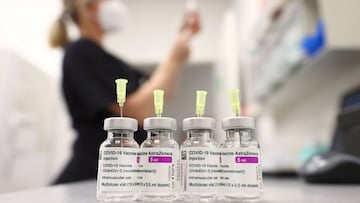Coronavirus US: when will the AstraZeneca vaccine be approved in the country?
There are currently three Covid-19 vaccines which have been authorised for emergency use in the United States by the Food and Drug Administration (FDA).

As of 24 March 2021, three different Covid-19 vaccines have been approved for Emergency Use Authorization (EUA) in the United States by the Food and Drug Administration (FGA). Two other Covid-19 vaccines (Oxford/AstraZeneca and Novavax) are either still undergoing Phase III trails or awaiting authorisation by the FDA.
Almost 130 million doses have been administered in the US so far
The three vaccines currently in use in the US are: the Pfizer-BioNTech vaccine which is two shots, administered 21 days apart; the Moderna vaccine – also two shots but administered one month (28 days) apart; and the Johnson & Johnson / Janssen vaccine - a one-shot viral vector vaccine which was the most recent to receive authorisation on 27 February. So far, 128,217,029 doses have been administered in the US, roughly about 39 for every 100 people.
.@POTUS promised Americans that we would administer 100 million #COVID19 vaccinations within the first 100 days of his Administration. It seemed ambitious, but achievable. I am proud to say that we have already reached that goal far ahead of schedule! pic.twitter.com/UqK38I0UXB
— Rochelle Walensky, MD, MPH (@CDCDirector) March 19, 2021
The Oxford/AstraZeneca vaccine was approved for use in the United Kingdom on 30 December 2020 then by the European Union’s drugs regulator at the end of January this year. It had passed four rigorous clinical trials in the UK, Brazil and South Africa, and showed 62% effectiveness at preventing the disease which rose to 90% when people were given a half dose followed by a full dose 12 weeks later.
So far, over 20 million doses of the AstraZeneca vaccine have been administered within the UK and EU countries. However, concerns about the safety of the vaccine were raised following reports of the formation of blood clots in some people who had been vaccinated, prompted some countries to temporarily suspend use of the AZ vaccine until more tests were conducted.
Vaccination has since resumed in EU countries this week after the European Medicines Agency (EMA) confirmed that the AZ vaccine doesn’t increase the overall incidence of blood clots. The EMA had reviewed only seven cases of blood clots in multiple blood vessels (disseminated intravascular coagulation, DIC) and 18 cases of CVST (Cerebral Venous Sinus Thrombosis) out of 20 million doses administered.
Together with our partners, @gavi @WHO @CEPIvaccines, we are doing everything possible to ensure people around the world have access to safe, effective Covid-19 vaccines, wherever they live and regardless of income level. More from CEO Pascal Soriot: https://t.co/gQp9VDTsTz pic.twitter.com/NuTuThUaFV
— AstraZeneca (@AstraZeneca) March 10, 2021
AstraZeneca Phase III trails completed in the US
The results of the AstraZeneca US Phase III trial of AZD1222 vaccine were released earlier this week and showed the vaccine to be 79% effective at preventing symptomatic Covid-19, 100% effective against severe or critical disease and hospitalisation with comparable efficacy result across ethnicity and age, with 80% efficacy in participants aged 65 years and over. The Phase III trial involved 32,449 participants (79% were white/Caucasian, 8% black/African American, 4% native American and 4% Asian, and 22% of participants were Hispanic).
Ann Falsey, Professor of Medicine, University of Rochester School of Medicine, US, and co-lead Principal Investigator for the trial, said: “These findings reconfirm previous results observed in AZD1222 trials across all adult populations but it’s exciting to see similar efficacy results in people over 65 for the first time. This analysis validates the AstraZeneca Covid-19 vaccine as a much-needed additional vaccination option, offering confidence that adults of all ages can benefit from protection against the virus.”
Related stories
Executive Vice President at BioPharmaceuticals R&D Mene Pangalos, added: “These results add to the growing body of evidence that shows this vaccine is well tolerated and highly effective against all severities of Covid-19 and across all age groups. We are confident this vaccine can play an important role in protecting millions of people worldwide against this lethal virus. We are preparing to submit these findings to the US Food and Drug Administration and for the rollout of millions of doses across America should the vaccine be granted US Emergency Use Authorization.”
AstraZeneca will continue to analyse the data from the latest trial and prepare for the primary analysis to be submitted to the FDA for Emergency Use Authorization in the coming weeks which means it could be approved by mid-April if not earlier.

